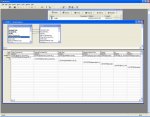I have a access97 database that pulls data out of Navision accounting software through odbc. We are upgrading to a newer version and a newer odbc. The old odbc driver - 'blank' fields were zero length. ("") The new odbc driver - 'blank' fields are Null.
The way the system is setup - is it runs 3 querys.
Add - this adds only records that don't exist in the access table vs Navision.
Delete - this deletes only the records in access that don't exist in Navision
Update - only updates the records that have any change in them
The update query is the issue. Now that the blank fields are null - if the field starts out as null in navision and then gets populated - these fields don't get updated in access. The criteria isn't true. (if that makes sense)
See the screen shot of the update query. Mainso is the access table and 'start' is the table from navison (actually a query combining 2 tables from nav) Is there an more elegent way do do this? The way it runs now works great because you are only adding,deleting and updating the records that are different from navision. (instead of say - deleting all the records and re-populating the access table - which takes a lot longer and exposes a blank table for a period of time during the re-population)
Thanks
sam
The way the system is setup - is it runs 3 querys.
Add - this adds only records that don't exist in the access table vs Navision.
Delete - this deletes only the records in access that don't exist in Navision
Update - only updates the records that have any change in them
The update query is the issue. Now that the blank fields are null - if the field starts out as null in navision and then gets populated - these fields don't get updated in access. The criteria isn't true. (if that makes sense)
See the screen shot of the update query. Mainso is the access table and 'start' is the table from navison (actually a query combining 2 tables from nav) Is there an more elegent way do do this? The way it runs now works great because you are only adding,deleting and updating the records that are different from navision. (instead of say - deleting all the records and re-populating the access table - which takes a lot longer and exposes a blank table for a period of time during the re-population)
Thanks
sam

